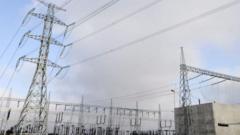Finnish police are scrutinizing the involvement of a Russian vessel in the recent severing of the Estlink 2 power cable, indicating a broader issue regarding maritime threats in the region.
Finland Probes Possible Russian Involvement in Undersea Cable Damage

Finland Probes Possible Russian Involvement in Undersea Cable Damage
Finnish authorities investigate the potential sabotage of an electricity cable linked to a Russian tanker amidst growing concerns over maritime security in the Baltic Sea.
In an alarming development, Finnish authorities have announced an investigation into a possible Russian connection to the recent damage of the Estlink 2 electricity cable, which connects Finland and Estonia. It is believed that the tanker Eagle S, flagged with the Cook Islands, might have caused the disturbances due to its anchor. This incident has been linked to a broader issue defined by the presence of Russia's "shadow fleet," which typically transports sanctioned oil products.
Following the cable’s disconnection on Wednesday, Fingrid, the operator overseeing Finland's national grid, stated that despite the damage, the overall electricity system's operation remains stable. However, repairs may take several months, leaving the Estlink 2 cable out of service.
Robin Lardot, from Finland's National Bureau of Investigation (NBI), described the investigation as exploring "grave sabotage." Finnish President Alexander Stubb emphasized the importance of preventing potential risks from vessels affiliated with Russia's shadow fleet during his communications on social media platform X.
The investigation has national and international implications. Finland's police describe the situation as "aggravated criminal mischief," and European institutions are responding with potential sanctions against Russia for the damages to critical infrastructure. A joint statement from the European Commission condemned any intentional destruction of European infrastructure, echoing sentiments from Estonia’s Foreign Minister Margus Tsahkna.
Tsahkna highlighted the increasing frequency of assaults on vital underwater structures, suggesting that such damage can no longer be brushed aside as accidental or due to poor navigation. He called for urgent recognition of this emerging threat to national security in the Baltic Sea.
Alongside this incident, recent months have seen a series of disruptions affecting underwater cables in the region. A telecommunications cable between Finland and Germany was cut in November, and connectivity issues arose between Lithuania and Sweden’s Gotland Island around the same time. German authorities continue their investigation into the 2022 Nord Stream gas pipeline explosions—adding a complicated layer to the discourse surrounding undersea security.
Security experts are now left to ponder the vulnerability of undersea cables that facilitate international communications and power supplies, amid further incidents suggesting a systematic pattern of attacks on crucial infrastructural elements.
Following the cable’s disconnection on Wednesday, Fingrid, the operator overseeing Finland's national grid, stated that despite the damage, the overall electricity system's operation remains stable. However, repairs may take several months, leaving the Estlink 2 cable out of service.
Robin Lardot, from Finland's National Bureau of Investigation (NBI), described the investigation as exploring "grave sabotage." Finnish President Alexander Stubb emphasized the importance of preventing potential risks from vessels affiliated with Russia's shadow fleet during his communications on social media platform X.
The investigation has national and international implications. Finland's police describe the situation as "aggravated criminal mischief," and European institutions are responding with potential sanctions against Russia for the damages to critical infrastructure. A joint statement from the European Commission condemned any intentional destruction of European infrastructure, echoing sentiments from Estonia’s Foreign Minister Margus Tsahkna.
Tsahkna highlighted the increasing frequency of assaults on vital underwater structures, suggesting that such damage can no longer be brushed aside as accidental or due to poor navigation. He called for urgent recognition of this emerging threat to national security in the Baltic Sea.
Alongside this incident, recent months have seen a series of disruptions affecting underwater cables in the region. A telecommunications cable between Finland and Germany was cut in November, and connectivity issues arose between Lithuania and Sweden’s Gotland Island around the same time. German authorities continue their investigation into the 2022 Nord Stream gas pipeline explosions—adding a complicated layer to the discourse surrounding undersea security.
Security experts are now left to ponder the vulnerability of undersea cables that facilitate international communications and power supplies, amid further incidents suggesting a systematic pattern of attacks on crucial infrastructural elements.




















